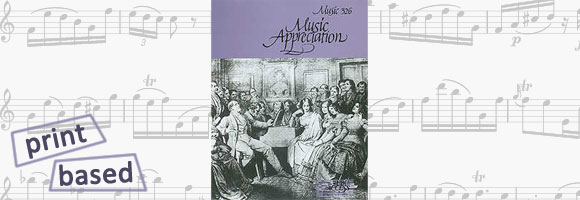
Course Outline
- Five assignments
- Final examination
Course Description
This course is an introductory course for which previous musical background is helpful, but not required. Contents include a discussion of musical concepts, evolution of forms, style, and media and detailed study of selected works from the concert repertoire.
Popular forms of music (jazz, folk, rock, and so on) are not included. The course is not for credit towards the B.Mus. or B.A. in Music degrees.
Although it can be viewed as a social phenomenon, or shown to correlate with the other arts, music is primarily a self-contained language–a form of communication with its own vocabulary, syntax, and rhetoric. Each culture produces its own music(s), and this course focuses exclusively on “classical,” or Western Art Music: that which developed in Europe during the past millennium, and was transplanted to North America during the eighteenth and nineteenth centuries.
Intended Audience
MUSC 326C is intended for all students who wish to develop an appreciation for what is commonly called “classical music.” To appreciate something is not merely to enjoy it. Implied also is an understanding of the issues involved (as in the expression “I appreciate your concern”), and the course is designed to provide you with a basic understanding of the aesthetics and background of a work you may hear on the radio, on record, or in concert. Prior musical training is not required. Although jargon for its own sake will be avoided, there is a standard language used in discussing music, and those terms will be defined and explained.
Course Objectives
Upon completion of this course you will have acquired the following:
- a basic understanding of, and a sensitivity to, the creative process in music: how composers choose and develop their material;
- a grasp of the important musical styles from the Baroque period to the present, and an awareness of the principal forms in each era;
- a sense of the flow of musical history: the position of most major composers within that continuum, and the influences each had upon their colleagues and upon succeeding generations of composers. A special effort has been made to present each work in context with similarly-conceived compositions, rather than as an isolated effort.
Course Overview
The course is in two parts which are subdivided into nineteen lessons. The first part, covering Lessons One through Eleven, begins with an introduction which discusses the roles of the composer, performer, and listener in the music-making process. Six lessons then discuss the basic building blocks of music: sound itself, sources of musical sounds, rhythm, melody, texture, and harmony. One lesson is devoted to examining the methods composers use to develop and shape their ideas and the two which follow consider smaller and expanded musical forms. An examination of sets of variations completes this first section of the course. The second part contains seven lessons that deal with instrumental and vocal musical styles from the late Baroque period until the beginning of the twentieth century. Included are representative works from the concert repertoire. A final lesson surveys major developments in the twentieth century and an Epilogue provides a brief overview of Canadian music.
Course Work
Since Music 326C is a six-credit course, you are allowed up to eight months to complete this distance education version. Each lesson will require approximately 10-12 hours of work, including time spent on the readings and listenings.
Self-Testing Exercises
A variety of self-testing exercises are provided with each lesson. These exercises will help you gauge your progress and prepare you for the graded assignments.
Assignments
There will be five graded assignments in which you will be asked to reply to some short-answer questions and to comment upon taped selections.
The sixth assignment is a formal term paper of ten to fifteen typewritten pages, with bibliography and footnotes included in which you will explore in detail a particular musical genre, or the music of a single composer or group of related composers.
Final Examination
The exam will include short-answer and brief essay questions.
Evaluation
The course will be graded out of 100 as follows:
| Five graded assignments @ 10 marks each |
50 marks |
| One Term Paper | 20 marks |
| Final Examination | 30 marks |
|
Total
|
100 marks
|
Course Materials
You will need to order your MUSC 326C Learner Package with the course manual from the UBC Bookstore. A set of CD’s with lesson and self-test examples will be included in this package. You will therefore need to have access to a CD player.
Required Materials:
- Kerman, Joseph. Listen. Sixth Edition. ISBN: 9780312434199
- Six CD’s to accompany Listen. (6th ed.) by Joseph Kerman. ISBN 9780312458904
Recommended Text:
- Oxford Dictionary of Music or Penguin Dictionary of Music
- Gordon, C., P. Simmons and G. Wynn. Plagiarism: What it is, and How to Avoid it. Vancouver: Faculty of Arts, University of British Columbia.
